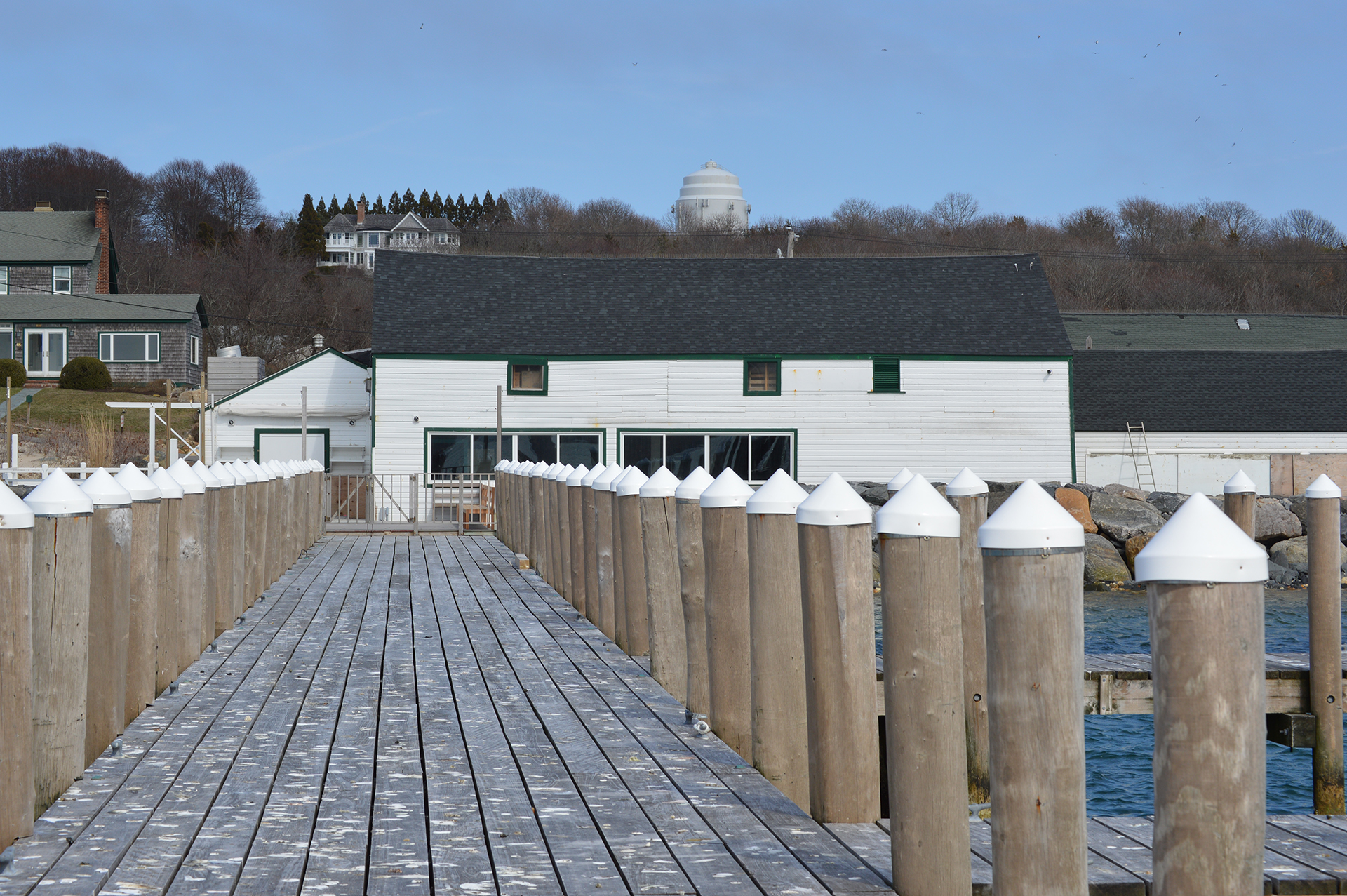Marc Rowan’s Vision For Duryea’s, And Beyond

Marc Rowan has a vision of the future for the Duryea’s Dock complex. “Being on Fort Pond Bay is kind of magical,” Rowan said in an exclusive interview March 30. “It is historic. It is beautiful.”
He spoke by phone from his Fifth Avenue residence, where he lives with his wife and daughter. The couple’s three sons, all now 20 or older, are out of the house.
Rowan’s vision for Duryea’s now is quite different than the one he first presented to the East Hampton Town Planning Board less than a year after his 2014 purchase of the iconic Montauk property. The Duryea’s complex totals over nine acres when the below-the-water ground is included. The site straddles the private Tuthill Road.
In 2015, Rowan asked for a permit to demolish much of what was there, and create a new restaurant farther back from the water’s edge. That site plan was not well-received by the planning board, or by neighbors of Duryea’s, and Rowan soon withdrew the proposal.
If Rowan misread the mood of the community with that first proposal in 2015, it would not be the first time in the billionaire’s life that he had made a mistake, and then rebounded.
After he graduated from the Wharton School of Business at the University of Pennsylvania, Rowan went to work for Drexel Burnham Lambert. In a 2009 talk before the Birthright Israel alumni community, the 56-year-old Rowan described his early days in the financial business world during the ’80s. “I think I was the only one in my class to go to work for Drexel,” he said. Six years later, Drexel filed for bankruptcy, done in by the turmoil in the junk bond market.
In 1990, he founded, along with Leon Black and Joshua Harris, Apollo Global Management. They received generous backing of $800 million from the French Crédit Lyonnais Bank. Rowan and his partners began turning a steady profit for Crédit Lyonnais, earning them $3 billion a year. Unfortunately, Rowan said during his 2009 talk, “that money went from New York to Paris. In the front door, and out the back door of the bank.”
And the French-owned institution was failing. When it collapsed in the mid-1990s, Rowan was, in a sense, again out of work. But, by that time, he and his partners at Apollo had built a strong reputation in the financial community. Today, Rowan’s net worth is estimated at over $3 billion, with Apollo seeing many times over that amount in assets.
Rowan said Saturday that he has been coming to Montauk for about 20 years, frequently driving from his Southampton residence with his mountain bike to ride the Hither Hills trails west of the recycling center.
‘What The Community Wanted’
Rowan’s new vision for the future of Duryea’s is, essentially, an old vision, with one major exception: a new, state-of-the-art septic system, to be installed across the street and up the hill on Tuthill Road. Otherwise, the new plans in place call for the current structures to remain, including the part of the complex known as Duryea’s Lobster Deck. According to the plans prepared by Rowan’s representatives, there will be 90 seats on the deck area and 28 seats at tables indoors, with an additional 16 bar seats.
“There is no expansion. There is no change. This is what the community wanted,” Rowan said.
Rowan wants to be allowed to employ a waitstaff at Duryea’s Lobster Deck. The Lobster Deck and the entire dock sit in an area zoned “waterfront,” in which restaurants are allowed, but only after the owner has obtained a permit from the town.
In 2018, Rowan, through his attorneys, Michael Walsh, as well as the law firm of Burke & Sullivan, with Walsh being the litigator, took the Town of East Hampton and its building department to court in three separate lawsuits. This past January, the town’s lead attorney, Michael Sendlenski, signed off on a
settlement of all three suits.
The agreement Sendlenski struck with Rowan mandated that the East Hampton Building Department issue a certificate of occupancy for the entire site. The word “restaurant” is not used in the certificate of occupancy mandated by the court stipulation between Rowan and the town. However, areas of food preparation and areas for dining are listed in the agreement.
More important, the agreement allows, going forward, “waitstaff service at the Duryea’s property,” while Rowan pursues an “expedited” site-plan review for a restaurant, and for a new septic system. With no new buildings planned, the new site plan covers the septic system and the permit needed to run a restaurant, though parking calculations still have to be ironed out.
Also, an agreement was struck for a building permit for renovations for a cottage just north of the dock. This cottage has a special place in Rowan’s heart.
The settlement set off a firestorm at East Hampton Town Hall, with critics questioning the reasoning behind the deal. One of opposing arguments was that, while the land Rowan owns west of Tuthill Road is zoned for waterfront use, which allows for business operations, the land on the eastern side of Tuthill is zoned residential. Should a property zoned for residential use be used for a septic system and parking spaces for a neighboring commercial property?
It is a false question, Edward Burke Sr., one of Rowan’s attorneys, said on March 30. According to Burke, all nine-plus acres of the Duryea’s complex are one property. He said that Perry Duryea had divided the properties “by deed,” and that such a subdivision is “procedurally improper and not binding.”
Rowan believes that much of the suspicion and opposition he has faced from neighbors and critics stems from property’s history. “The property has been the subject of zoning battles for many years,” Rowan said.
Duryea’s used to cater to a casual, “bring your own booze” crowd, who bought the prepared food and sat down on the dock to enjoy it. Duryea’s Lobster Deck now has a liquor license to sell wine and beer, eliminating the need to BYOB, and it still has a casual air, sitting as it does on Fort Pond Bay. But it also offers a world-class wine list, with many bottles going for several hundred dollars apiece. Town Councilman Jeffrey Bragman, a critic of the town’s settlement with Duryea’s, pointed out during one town board meeting that the Lobster Deck menu offered a family-sized side of French fries for $30.
Even with the expensive wine list, there still is a vestige of a BYOB feel: without waiters serving tables, when an expensive bottle of wine is purchased, Rowan said, “We pop the cork and put it back in.”
Rowan said that roughly half his seasonal clientele now come by sea, arriving by boat at one of the 11 slips designated as watery parking spaces by the town. During the summer season, a large number of yachts can be seen dropping anchor in Fort Pond Bay, meaning a lot of potential customers are just a few minutes away.
Facing The Challenges
It has been a learning process in Montauk for Rowan. After purchasing Duryea’s, he bought two houses, one at 75 Firestone Road, the other at 75 Fleming Road, in order to house his seasonal staff. However, the town’s rental registry law makes that a difficult, if not impossible approach to the labor shortage in the town, Rowan said. Since then, he has purchased two motels, the Neptune on South Euclid Avenue in downtown Montauk, and Ann Breyer’s Cottages on West Lake Drive. The two houses Rowan originally purchased are now back on the market.
Resort towns all tend to share three problems, Rowan said. Septic flow is one. Resort towns tend to be environmentally beautiful, but fragile. A new septic system at Duryea’s would check that issue off the list, he said, though, in the end, a state-of-the-art sewage treatment plant would be ideal. Still, the system Rowan is proposing to install changes effluence into 95 percent pure water, he said.
Labor in seasonal resort communities is another challenge, one that Rowan has now overcome, with the Ann Breyer purchase.
The last obstacle most resort areas have to wrestle with is traffic. With customers coming by boat, there is a reduced density on the roads, though neighbors still say there is too much vehicular traffic on Tuthill Road.
When Rowan was in his buying mode in Montauk, he purchased the restaurant opposite the train station, and did a major upgrade, creating the casual but high-end restaurant, Arbor. Arbor’s future, at least for the 2019 season, is still to be decided. Staffing two high-end eateries in Montauk at the same time may be a check too far, but Rowan will make that decision in the coming weeks.
Then there is the property at 80 Firestone Road, next to the Montauket, with a perfect view of Fort Pond Bay. It currently has four old cottages on it. Rowan brought in Viola Rouhani of Stelle Lomont Rouhani Architects to redesign the property. Rouhani designed three cottages to replace the four currently standing, each with a small pool. One of the cottages was two stories. All three cottages were situated for maximum view of the bay.
The East Hampton Town Planning Department opposed the proposal, based on the presence of what it thought was a landward bluff crest on the property. Rowan sued the town, and won in court. In the interim, however, accounting for a neighbor’s complaint about the proposed second floor blocking the view, as well as concern expressed about the swimming pools, Rowan asked Rouhani to again redesign. Now, there will be four small cottages, with hot tubs instead of pools, and no second floor. All will still offer unencumbered views of the bay. They will be available to guests of Duryea’s. Rowan intends to brand them as Duryea’s Cottages.
Meantime, Rowan, who also owns Lulu Kitchen and Bar in Sag Harbor, is in the process of expanding to the North Fork, and is in negotiations with Bob Haase to purchase Orient by the Sea at Orient Point. When he bought Duryea’s, Rowan said, he made the deal while allowing Chip Duryea to stay on and run the place as long as he wanted. Rowan is looking at following that model with Haase and Orient by the Sea.
Eventually, Burke said, Orient by the Sea might fall under the Duryea flagship, and become Duryea’s Orient by the Sea.
Finally, there is that cottage on the Duryea property, overhanging Fort Pond Bay itself, for which — as part of the settlement with the town — a building permit was issued for renovations. Currently a four-bedroom house, it is going to be converted to a one-bedroom structure. With their three sons now out of the house, and their daughter spending her summers at sleepaway camp, a one-bedroom house on Fort Pond Bay is the realization of a dream for the Rowans. Marc said he enjoys paddling out onto the water at daybreak.
A house right on the bay? “How could you have anything better than that?” Rowan asked.
t.e@indyeastend.com







